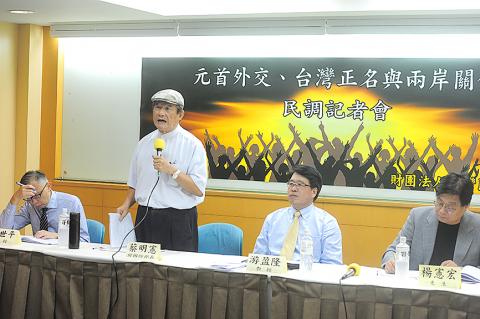More than half of the respondents to a poll last week said they do not like the nation being referred to as “Chinese Taipei,” and even more said they support using “Taiwan” for the 2020 Tokyo Olympics team, the Taiwanese Public Opinion Foundation announced yesterday.
Asked how they feel about Taiwan being called “Chinese Taipei” in global events, 51.9 percent of respondents said they do not like it, while 37.4 percent said they did like it, the poll found.
As for the idea of using “Taiwan” at the 2020 Tokyo Olympics, 65 percent of respondents voiced support, while 26.4 percent did not, the poll showed.

Photo: Wang Yi-sung, Taipei Times
Asked about President Tsai Ing-wen’s (蔡英文) performance, 33.3 percent of the respondents said they agree with her handling of national affairs, foundation chairman You Ying-lung (游盈隆) told a news conference in Taipei, adding that the numbers were basically unchanged from previous surveys.
Just over half (50.2 percent) said Tsai’s nine-day visit to Paraguay and Belize, with two stopovers in the US, has helped elevate the nation’s global presence, which was a significant increase of nearly 10 percentage points compared with respondents’ perception about her visit to Eswatini in April, You said.
Asked about Premier William Lai’s (賴清德) performance, 41.7 percent of respondents liked it, while 44.8 percent did not, the first time more people disapproved of him than approved, the poll found.
Taiwan United Nations Alliance chairman Michael Tsai (蔡明憲), who took part at the news conference, said more Taiwanese have signed a petition backing the use of the name “Taiwan” at the 2020 Tokyo Olympics after a series of Chinese bullying incidents.
Those incidents include the Taichung City Government’s loss of the right to host the first East Asian Youth Games due to Chinese pressure and Chinese netizens launching a boycott of Taiwan-based bakery chain 85?C after Tsai Ing-wen visited a branch in Los Angeles, California, on Aug. 12.
The poll also found the approval ratings of the Democratic Progressive Party and the Chinese Nationalist Party (KMT) tied for the first time, at 24.5 percent, You said.
Tsai Ing-wen’s cross-strait policy is more pragmatic than idealistic, but she should display more idealism if she wants to win more respect from the public, he added.
While her administration has made some progress in promoting its New Southbound Policy and an independent national defense industry, she has yet to increase the national defense budget to 3 percent of the nation’s GDP as promised, Michael Tsai said.
She has not paid enough attention to seeking the perpetrators of the 228 Incident and in realizing transitional justice, he added.
The poll, conducted by the Focus Survey Research, collected 1,074 valid samples through telephone interviews on Monday and Tuesday last week, and has a margin of error of 2.99 percentage points.

Taiwanese can file complaints with the Tourism Administration to report travel agencies if their activities caused termination of a person’s citizenship, Mainland Affairs Council Minister Chiu Chui-cheng (邱垂正) said yesterday, after a podcaster highlighted a case in which a person’s citizenship was canceled for receiving a single-use Chinese passport to enter Russia. The council is aware of incidents in which people who signed up through Chinese travel agencies for tours of Russia were told they could obtain Russian visas and fast-track border clearance, Chiu told reporters on the sidelines of an event in Taipei. However, the travel agencies actually applied

Japanese footwear brand Onitsuka Tiger today issued a public apology and said it has suspended an employee amid allegations that the staff member discriminated against a Vietnamese customer at its Taipei 101 store. Posting on the social media platform Threads yesterday, a user said that an employee at the store said that “those shoes are very expensive” when her friend, who is a migrant worker from Vietnam, asked for assistance. The employee then ignored her until she asked again, to which she replied: "We don't have a size 37." The post had amassed nearly 26,000 likes and 916 comments as of this

US President Donald Trump said "it’s up to" Chinese President Xi Jinping (習近平) what China does on Taiwan, but that he would be "very unhappy" with a change in the "status quo," the New York Times said in an interview published yesterday. Xi "considers it to be a part of China, and that’s up to him what he’s going to be doing," Trump told the newspaper on Wednesday. "But I’ve expressed to him that I would be very unhappy if he did that, and I don’t think he’ll do that," he added. "I hope he doesn’t do that." Trump made the comments in

Tourism in Kenting fell to a historic low for the second consecutive year last year, impacting hotels and other local businesses that rely on a steady stream of domestic tourists, the latest data showed. A total of 2.139 million tourists visited Kenting last year, down slightly from 2.14 million in 2024, the data showed. The number of tourists who visited the national park on the Hengchun Peninsula peaked in 2015 at 8.37 million people. That number has been below 2.2 million for two years, although there was a spike in October last year due to multiple long weekends. The occupancy rate for hotels